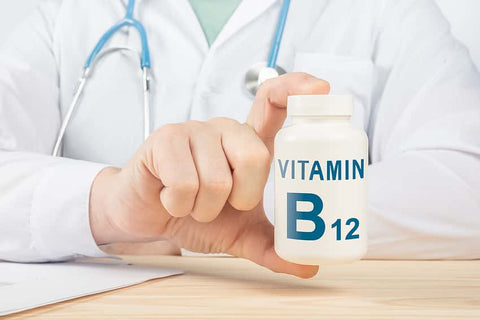If you’ve ever looked through the ingredients in energy drinks, vitamin B12 is in most, if not all of them. The front of the drink probably claims to boost energy and concentration, relating directly to the fact that it contains vitamin B12. Though, most of this is a marketing scam, because B12 doesn’t really increase energy on its own.
Vitamin B12 is contained in a lot of energy drinks because of the perception that it provides energy, boosts your mood, helps you concentrate, and improves your memory.
Some drinks even include upwards of 10,000% of your daily value for vitamin B12. However this may not be true for everyone. As with most things in nutrition and health, the effect that a vitamin or supplement has on you is very individualized, and vitamin B12 is no exception to this.
But why is there such a strong belief that B12 gives you energy, and why is it put into every energy drink on the market? Keep reading to find out!
What is Vitamin B12?
Vitamin B12, also known as cobalamin, is part of the B-complex vitamins; 8 vitamins that are essential for your overall health and bodily function.
Our bodies can’t make any of the B-complex vitamins naturally, so we have to get them from what we eat. Sources include meat, fish, poultry, eggs, milk, yogurt, cheese, and fortified foods like cereal.1
Most people get the amount of B12 they need through food alone, but those that are deficient can get injections or oral doses to raise their levels.
Some people are at a higher risk for B12 deficiency, including those who have celiac disease, Crohn's disease, HIV, regularly take antacids, are vegetarians or vegans, alcoholics, or those with immune dysfunction.
Symptoms of B12 deficiency include shakiness, muscle weakness, muscle spasms, fatigue, low blood pressure, and incontinence.2
Research has shown that almost two-fifths of American adults have a B12 deficiency, whether they know it or not.2 B vitamins also like to stick together, so if one is deficient, then it's likely the other ones are also deficient.
B12’s main function is involved in red blood cell formation, cell metabolism, nerve function, and the production of DNA.3 It also can act as a coenzyme in the conversion of proteins and fats into energy.
This is why it's often added to energy drinks, to give you a burst of energy, in extremely high amounts. Though, this is a misconception. Let's explore further!
B12 for Energy: Does it Work?
The key point in this argument is that B12 helps you convert the food you eat into energy, not that it provides you energy by itself.
Vitamins can’t produce energy on their own, they can only act as a catalyst to other enzymes and substances that help create energy from the food that you eat.
Carbohydrates and food containing glucose can give you direct energy on their own, and vitamins like B12 help release the energy from them.
Your body takes this energy-containing food and breaks it down into ATP. ATP is the form of energy that all the cells in your body used to power themselves to keep operating. Vitamins like B12 help this process happen and allow the ATP to be released.
Think of B12 as a group of sticks, it helps create the fire alongside matches. If there are no matches to light the sticks, the sticks cannot make fire spontaneously on their own. B12 is not a stimulant like caffeine, so it can’t actually cause you to feel like you have more energy.
There is a caveat here though!
If you have a vitamin B12 deficiency and you consume B12, either through a supplement or natural food, you will feel like you have more energy as your levels of B12 start to regulate again.
However, this can take a couple of weeks of consistent intake of B12. If you are drinking an energy drink, chances are that the bump in energy you feel is from caffeine, amino acids, or creatine, not from any amount of vitamin B12.
All these things are known to help increase energy because they are stimulants that cause an increase in energy.
If you aren’t deficient in vitamin B12 and you drink an energy drink or take a supplement packed with B12, you will most likely urinate most of it out after your body takes the B12 that it needs, as it is a water-soluble vitamin and will not be stored.
But you won’t feel any extra increase in energy levels. This means that out of your energy drink that contains 10,000% of your daily value of B12, you will likely be excreting the majority of it.
Conclusion
So, to summarize, B12 only provides you with energy by assisting in the breakdown of the food that directly provides you with energy.
If you are already deficient in B12, then you may feel a jump in energy upon consumption as your levels begin to return to baseline, but otherwise, it won’t give you any energy on its own.
Energy drinks give you energy from the caffeine and, often sugar, contained in them, but certainly not from the B12.
If you are concerned about any possible nutrient deficiencies, you should consult your doctor. Otherwise, supporting your overall health by bridging any potential nutrient gaps with the use of a multivitamin would also be beneficial!
Performance Lab NutriGenesis Multi helps you maintain your overall health and wellbeing by providing you with appropriate levels of 17 essential vitamins and minerals, including vitamin B12, to help your energy metabolism, heart health, nervous system, and cognitive function.
References
- Watanabe F. Vitamin B12 Sources and Bioavailability. Experimental Biology and Medicine. 2007;232(10):1266-1274. doi:10.3181/0703-MR-67
- O’Leary, Fiona, and Samir Samman. “Vitamin B12 in Health and Disease.” Nutrients. 2010;2(3):299-316.
- D Smith, M Warren, H Refsum. Vitamin B12. Advances in Food and Nutrition Research. 2018;83:215-279











